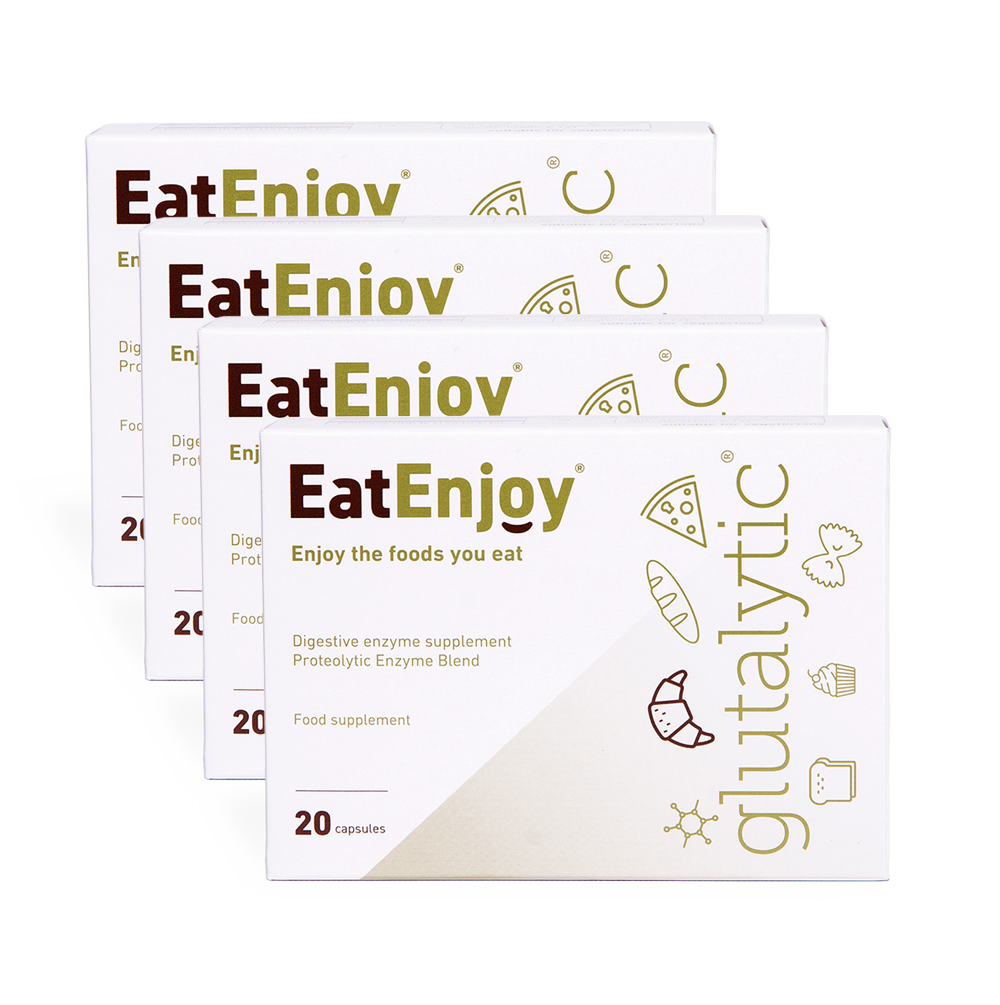Last Updated on January 18, 2022
Today, we’re going to be answering the question of whether an anti-gluten pill is effective, safe, and whether it’s suitable for you to continue eating gluten if you’re celiac or gluten intolerant. It would be amazing if there was a magic celiac pill that could prevent all the symptoms we struggle with most when consuming gluten. But is there such a thing? And how effective are they? Let’s take a closer look.
Anti Gluten Pill – Does It Exist?
In short – yes. There are dietary supplements out there that claim to help the digestion of gluten and relieve any symptoms that you usually have. While medical experts have said that there is no enzyme available that can break down gluten, many gluten intolerant individuals have given rave reviews of the products and claimed that they’ve changed their life around.
However, enzymes can help break down food (not just gluten though!). Digestive enzymes provide relief and aid with the breaking down of food, so this may be why so many people have made claims that the anti-gluten pills they’re using are working. In short, your body is breaking down everything you’re consuming more effectively, so your symptoms will likely reduce.
There are many anti-gluten pills available; each usually making their own individual claims. Let’s take a look at some of the most popular enzymes for gluten intolerance.
Glute Guard
Glute Guard is an Australian brand that is marketed as a way to enjoy food without gluten getting in the way. It’s important to note that this brand suggests that you should only take this tablet before eating out, or if you’re unsure if something is entirely gluten-free due to issues like cross-contact. This pill is more to give you peace of mind that you’re eating is gluten-free, rather than suggesting you go out and eat the largest pizza you can find.
It’s said to help protect against accidental gluten ingestion and one tablet should be eaten before a meal to stop these symptoms from occurring. It is recommended for all gluten sensitivities and they claim to be the only product that is clinically proven to help with symptoms on the market.
Sometimes the preparation of food is out of your control, but with Glute Guard it’s easy to take back the reins – that’s what they’re suggesting anyway!
Glute Guard uses an enzyme called caricain, which is actually an active ingredient from the fruit, papaya. To find out more about Glute Guard and buy your own blister pack, you can do so here. The 10 pack blister is £10.95 and the 30 pack blister is £21.95.
EatEnjoy Glutalytic
EatEnjoy Glutalytic is another popular choice of anti-gluten pill. This particular supplement is marketed as a way to allow you to eat gluten without discomfort. They claim that “you can eat the foods you enjoy including breads, pastas, cereals, biscuits, and cakes!” However, further down in their description it says it’s “not intended to diagnose, treat, cure or prevent celiac disease“.
Despite its claims, you should use this product in the same way as Glute Guard. It will help to support the digestion of gluten and will minimize any symptoms you may have. You can take this tablet in the same way as Glute Guard and you can also have this pill during a meal too. If you start to feel symptoms mid-way through a meal, having one of these pills can help bloating and cramps.
These are a cheaper alternative to Glute Guard, coming in at £12.99 for a blister pack of 20. However, something that seems odd to me – in the list of ingredients, it says: “soy, wheat, and lactose are used”…that seems counterproductive to me!
They confirm that this dietary supplement is not for those with celiac disease. You should only consume this pill if you are gluten intolerant.

Are Anti Gluten Pills Suitable For Celiacs?
I can not stress this enough: no. Anti gluten pills are not suitable for celiacs. I would not encourage anyone with gluten intolerance to pop one of these in and have a gluten feast – but definitely not celiacs. The difference between gluten intolerance and celiac disease is huge.
While gluten intolerance can be a huge change to your life, besides the symptoms, you aren’t doing damage to your body. However, if a celiac continues to eat gluten, it can become very serious. And lead to many health problems and damage to your body in the future.
However, there’s plenty of research being done on this subject matter. In mid-2021, a Norwegian journalist posted this article about a potential new pill against celiac disease. While it’s shown extremely positive results, it’s not ready to be marketed just yet. However, it gives those of us with celiac disease some hope for the future. You can read the full article here.
If those with celiac disease accidentally ingest gluten, it’s okay to take the supplements as it will help to ease symptoms. But it’s most certainly not a free pass to eat gluten whenever you want to.
When Should I Take An Anti-Gluten Pill?
If you’re going out for a meal, or ordering take-out, or are simply worried about cross-contact – anti-gluten pills are great! Or if you think you may have accidentally had gluten, it can be great for helping symptoms. So although they don’t completely stop any gluten issues you have, they can make your life easier.
Some other brands you may like to try are:
- Gluten Ease
- Gluten Digest
- Wheat Rescue
- Gluten Cutter
- Gluten Away
Conclusion
I hope this article has given you more information about the enzymes you can try for gluten intolerance. Unfortunately, there is no magic pill that can cure us of gluten intolerance or celiac disease. However, research is being made and we can keep our fingers crossed for the future.
Have you found that anti-gluten pills help? Please let me know in the comments below your experiences.

Hi, my name’s Zoë. I’m 28 years old and live in London, UK. I work full time as a freelance writer and critic for West End theatre. Writing has been a passion of mine for as long as I can remember. I spend most of my free time at the theatre, or at conventions. I’m married to the love of my life, and live in a small apartment with my fur baby, Lillie. I run two of my own blogs: No Safer Place and Stage to Page: both of which have won awards. I also have a YouTube channel where I talk about all things stagey.
